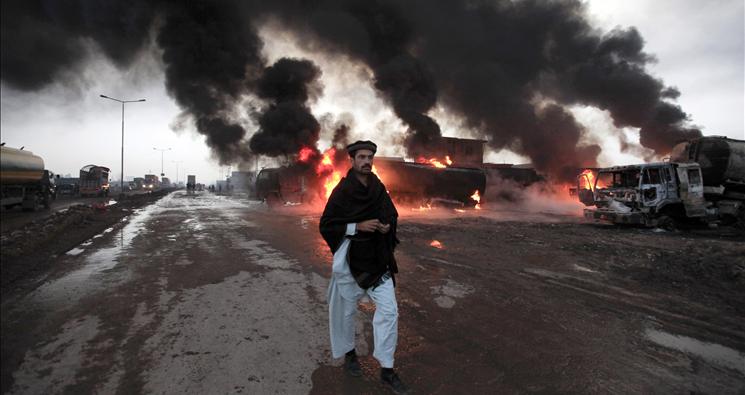200 Families Displaced in Pakistan after Minor Accused of Blasphemy
At least 200 families have fled their homes in Islamabad, the capital of Pakistan, to save their lives after a young Christian girl was accused of burning the Qur’an. According to the latest reports, Muslims are looting the abandoned houses, setting fire to Christians’ belongings, and they have desecrated the local church building.
The Christians of Meharabadi Jaffar fled from the colony after the local Muslims failed in their attempt to burn alive Rimsha Masih (who is about 13-year-old) on August 16. Rimsha was accused by a Muslim neighbor of burning pages of the Qur’an. A large crowd of people gathered after the local mosque announced that a Christian girl had burned the Qur’an. The Ramna Police Department intervened at about 8 p.m. when Muslim women were ruthlessly beating Rimsha and Muslim men were verbally insulting her. The angry crowd was on the verge of setting Rimsha on fire when the police put Rimsha and her family in a van and fled the scene.
The Ramna Police Station is only a few hundred meters from Meharabadi Jaffar. About 1,500 men, including local clerics and madrassa (Islamic seminary) students, soon arrived and surrounded the police station. They demanded Rimsha and her family be handed over to them. Anticipating this possibility, the police had already moved Rimsha and her family to a safer location. The police immediately registered a crime report against Rimsha under the blasphemy laws and distributed its copies among the angry protestors to pacify them.
The next morning, Rimsha was taken in an armored vehicle to the court. The police used an armored vehicle fearing that the extremists might attack Rimsha again. Rimsha remained in the vehicle while the investigation officer, Zabiullah, appeared before the magistrate and requested that she be sent to jail. Zabiullah told the Center for Law and Justice (CLJ), ECLJ’s affiliate in Pakistan, that a crowd of clerics and men had gathered outside the court premises. The crowd carried kerosene oil and ran after the vehicle for about one kilometer. Zabiullah said, “They tried to throw the kerosene oil on the vehicle to burn Rimsha, me and other policemen inside the vehicle.”
The religious community was infuriated when they learned that Rimsha had been moved to the prison where they had no access to her. Within a few hours, between 1,500 to 2,000 men, including students from the nearby Laal Masjid (Red Mosque where the Pakistan Army conducted a military operation against the extremist in 2007) surrounded the police station and torched three police vans and a nearby police post. The main road in front of the police station remained blocked for about five hours. Zabiullah told the CLJ that Pakistani television channels initially aired these scenes of rampage but then stopped after the government intervened. He added that a case had been registered against more than 150 hooligans, but no arrests had been made.
Rimsha was arrested on the eve of August 16, and was sent to Adiala Jail the next morning. The investigation officer had no time to interrogate her thoroughly. Zabiullah told the CLJ that he would submit his investigation report (challan) right after the Eid holidays. At this point, he has not acquired any evidence of Rimsha’s age, but he claims that she is 16 years old, which means that she is not a minor and can be awarded life imprisonment for burning the Qur’an, if convicted. There were reports that Rimsha has Down’s syndrome, but Zabiullah has not ordered Rimsha’s medical evaluation. Instead, he has concocted a story that Rimsha had an affair with a Muslim boy and that she desecrated the Qur’an after she was jilted by him. He said that Rimsha brought suparas (booklets containing chapters of the Qur’an) and burned them publicly. Zabiullah told that CLJ that “after committing this crime, she shouted: ‘O you Muslims! Come and see what I have done to your Holy Book. You do whatever you can.” The crime report lodged by the complainant, Al-Saeed Muhammad Ammad, against Rimsha, however, states that the incident involved 10 to 12 pages of a prayer book and not of the Qur’an.
Zabiullah’s version has been contradicted by a Christian woman, Samira, who is Rimsha’s neighbor and witnessed the incident. Samira also fled from Meharabadi Jaffar and is now living in another Christian community in Islamabad. She says Rimsha was a child between the ages of 12 and 14, and a slow learner. She said that she had seen Rimsha collecting waste papers to prepare chips for her younger brother and sister. She denied that Rimsha had any affair with any Muslim boy. She said that Rimsha kept urging the neighboring woman to tell the people that those papers were given to her. Samira claimed that Rimsha was “begging Muslim woman to tell the truth while the police were putting Rimsha in the van.” Samira also confirmed that Rimsha had not attended school and that she could not read or write.
Samira’s husband, Ashraf Masih, said that the Christians of Meharabadi Jaffar were extremely poor. “The Christians had no respect in the colony. The Muslims could harass and molest a Christian woman whenever they wanted,” Ashraf said. He said if any Christian objected to mistreatment, then he would be ruthlessly beaten.
On August 19, the President of Pakistan took notice of the incident. Earlier, during a meeting with a Vatican representative, he had vowed not to allow misuse of Pakistan’s anti-blasphemy laws. Nothing has changed yet for the Christian families of Meharabadi Jaffar, which is only few kilometers from the capital—the seat of Presidency. Until the filing of this report, all the Christian families are still in hiding in slums of Islamabad and poor Christians of these slums are providing them food and shelter.
